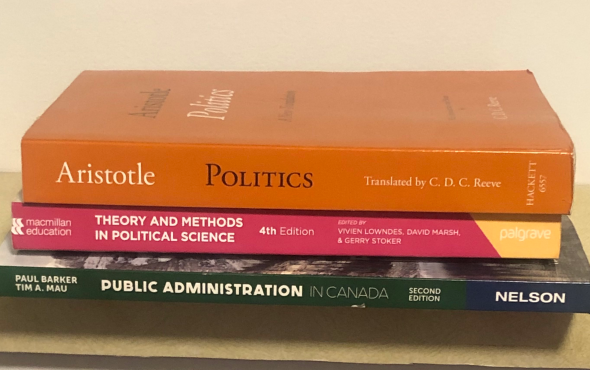Exploitation of university students needs to end

Textbooks. Photo by Raheem Uz Zaman,
Well, it’s that time of year again: university has started and we are forced into buying textbooks by some of our instructors.
With inflation this year at the highest it’s been in decades, the cost of goods and services, which includes textbooks, has ballooned to the point where it’s almost unaffordable to purchase university textbooks. Hence, it is imperative that all university textbooks become free to tackle inflation.
One approach universities can take to make textbooks free is to fund the cost of textbooks through donors or have the provincial or federal government pay for it. However, as capitalism is embedded in Canadian society, politics, and economy, this approach may never come to fruition.
A second option to offset the financial burden associated with textbooks is to take advantage of open educational resources. For instance, the UVic library offers free online e-textbooks for multiple courses. The downside of this resource is that options are limited as not every course has access to a free e-textbook
In 2012, BCcampus, an organization primarily funded by the Ministry of Advanced Education and Skills Training, launched a free e-textbook website. Options on this open educational resource are abundant, especially for first and second-year courses, with 382 textbooks available. However, this organization is only allowed to publish books that are public domain or those that have an open-copyright license, meaning the author or publisher has allowed it. Unfortunately, if the author or publisher refuses to allow open-copyright, then it impedes the progress of universalizing free textbooks and fails to put an effective dent in inflation.
I have crossed paths with the BCcampus open educational resource before. About two years ago, I was studying at Columbia College — a community college located in Vancouver. I took multiple second-year psychology, history, and political science courses over there, and most of the books in those courses were free as my conscientious instructors took advantage of the BCcampus open educational resource. I have saved over $500 due to my instructors at Columbia College embracing free educational resources; UVic instructors, if they have the option, should do the same.
The B.C. government’s policy initiatives towards free textbooks have been far from inactive. In 2019, the Ministry of Advanced Education and Skills Training announced funding of $3.26 million towards open educational resources. As explained above, the emphasis on free textbooks by the B.C. government has helped me out personally, but universalizing free textbooks is almost impossible due to the current economic system that we live in — one that stresses exploiting students with inflated textbook prices to profit as much as possible.
In 2017, Maclean’s put together a list of the most expensive universities in Canada in terms of the cost of textbooks for the academic year. Out of a list of 51 universities in Canada, UVic is the 26th most expensive university for books. To my surprise, books on average cost more at UVic ($780.94) than at UBC ($749.19) and UofT ($707.22) in 2017. This is an embarrassing statistic for UVic.
The astronomical prices of university textbooks make the already stressful lives of university students that much more stressful. As a result of seemingly unaffordable textbook prices, university students may face the predicament of cutting their food budget so that they can buy textbooks and continue their university education.
Other university students may have to resort to student loans to pay for textbooks. Giving out student loans to eligible candidates just shows the reification of capitalism by the provincial and federal government.
Free university textbooks or the proliferation of university textbooks in open education resources will help offset some of the pressures faced by university students. However, the problem with this approach is that the dominant capitalist philosophy that governs our society and politics undermines the free textbook movement.
In my opinion, inflated university textbook prices have impacted international students at UVic the most. International students already pay more in tuition fees, and they get billed a B.C. Medical Services Plan health fee of $75 every single month. Now, the rise in textbook prices has put even more financial pressure on their shoulders. As an international student myself, I can confirm this stressful situation!
Education is crucial for the intellectual and moral development of students, especially young students who have directly come to university after high school. Inflated textbooks and the exploitative nature of capitalism threaten this development. Although the provincial and federal governments have made progress in addressing this issue, more needs to be done in order for true equity.







